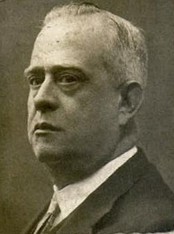Antonio Lara Zárate facts for kids
Quick facts for kids
Antonio Lara Zárate
|
|
|---|---|
 |
|
| Deputy for Santa Cruz de Tenerife | |
| In office 28 June 1931 – 7 January 1936 |
|
| Deputy for Seville | |
| In office 16 February 1936 – 2 February 1939 |
|
| Minister of Finance | |
| In office 12 September 1933 – 3 March 1934 |
|
| Preceded by | Agustín Viñuales |
| Succeeded by | Manuel Marraco Ramón |
| Minister of Justice | |
| In office 19 February 1936 – 13 May 1936 |
|
| Preceded by | Manuel Becerra Fernández |
| Succeeded by | Manuel Blasco Garzón |
| Minister of Public Works | |
| In office 19 July 1936 – 19 July 1936 |
|
| Preceded by | Bernardo Giner de los Ríos |
| Succeeded by | Joan Lluhí |
| Personal details | |
| Born | 18 December 1881 Santa Cruz de Tenerife, Spain |
| Died | 24 February 1956 (aged 74) Mexico City, Mexico |
| Occupation | Lawyer, politician |
Antonio Lara Zárate (born December 18, 1881, died February 24, 1956) was an important Spanish lawyer and politician. He was a member of the Spanish Parliament, called the Congress of Deputies, during the time of the Second Spanish Republic (1931–1939). He also served as a government minister, holding roles like Minister of Finance, Minister of Justice, and Minister of Public Works. After the Spanish Civil War (1936–1939), he moved to Mexico and lived there until he passed away.
Contents
Early Life and Career (1881–1931)
Antonio Lara Zárate was born on December 18, 1881, in Santa Cruz de Tenerife, which is in the Canary Islands of Spain. His father worked for the Ministry of War.
When he was 17, Antonio moved to mainland Spain. From 1899, he studied Law at the University of Seville. He finished his law degree in 1905. After that, he went back to the Canary Islands and started a successful career as a lawyer. He got married and had three children.
In 1908, Antonio Lara spoke out against a plan to change local government. From 1913, he was the Secretary of the new Tenerife Island Council. He also served as the Dean (head) of the Santa Cruz de Tenerife Bar Association from 1920 to 1922. In the 1920s, he became a leader in the Republican Party of Tenerife.
Political Career During the Second Spanish Republic (1931–1939)
Antonio Lara was closely connected to Alejandro Lerroux, who became the head of the government in Spain in 1931.
Becoming a Deputy
On June 28, 1931, Antonio Lara was elected as a deputy (a member of parliament) for Santa Cruz de Tenerife. He held this position until October 9, 1933. Soon after, he joined the national leadership team of the Radical Republican Party. He was very active in parliamentary discussions. He was also a member of important committees, including those for Agriculture, Navy, and Budget.
In 1932, he became the second vice president of the Cortes, which is the Spanish Parliament. He also helped write the plan for the Statute of Catalonia, which gave more self-rule to the region. In 1933, he was part of a group that looked into the Casas Viejas incident, a serious event that happened in January of that year.
Serving as a Minister
Antonio Lara served as the Minister of Finance in two governments led by Alejandro Lerroux (from September 1933 to March 1934). He was re-elected as a deputy for Santa Cruz de Tenerife in November 1933.
Later, Antonio Lara disagreed with Lerroux about working with certain political groups. In 1934, he left Lerroux's party. He then became the president of the new Republican Union party, led by Diego Martínez Barrio.
On February 16, 1936, Antonio Lara was elected as a deputy for Seville. He became the Minister of Justice in the governments of Manuel Azaña and Augusto Barcía Trelles (from February to May 1936). He was also briefly named Minister of Public Works on July 19, 1936, in a very short-lived government.
During the Spanish Civil War
During the Spanish Civil War (1936–1939), Antonio Lara attended some parliament meetings. However, he mostly lived in Barcelona and Paris. In Paris, he worked at the Spanish Embassy.
Manuel Azaña, who was the President of the Republic, wrote in his memories about a long meeting with Lara in August 1937. Lara told him that the disagreements among the Republicans were hurting their image in other countries. He said that showing pictures of Lenin and Stalin in propaganda films made it hard for the President to talk about democracy and freedom.
Life in Exile (1939–1956)
In 1939, after the Spanish Civil War ended, Antonio Lara moved to Great Britain. In September 1940, he managed to travel by ship from Liverpool to Veracruz, Mexico. It took many years for him to be reunited with his first son, Cristóbal, and even longer to see his son Juan again. His two daughters and his wife stayed in Santa Cruz de Tenerife.
In Mexico, he worked as a lawyer for a law firm. He also advised the Mexican President, Manuel Ávila Camacho. He continued to be a member of the Republican Union party and was active in politics with Martínez Barrio, who was also in exile.
Antonio Lara Zárate passed away on February 24, 1956, in Mexico City.
Sources
See also
 In Spanish: Antonio Lara Zárate para niños
In Spanish: Antonio Lara Zárate para niños
 | Aaron Henry |
 | T. R. M. Howard |
 | Jesse Jackson |

